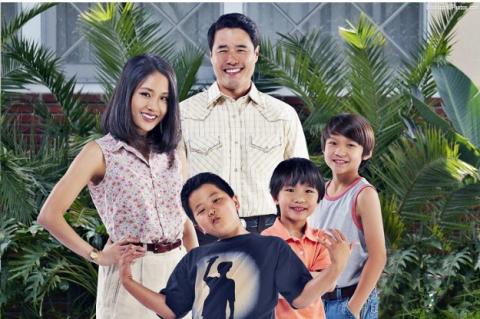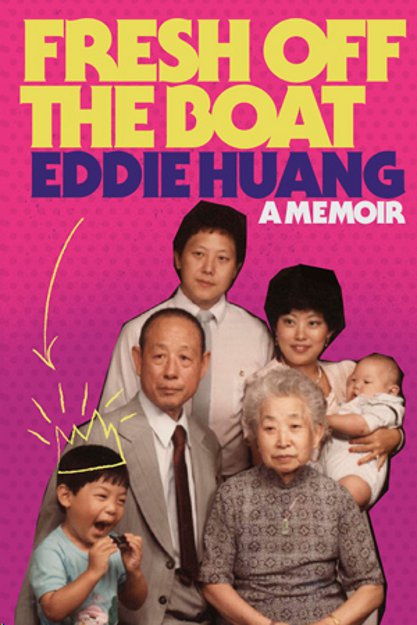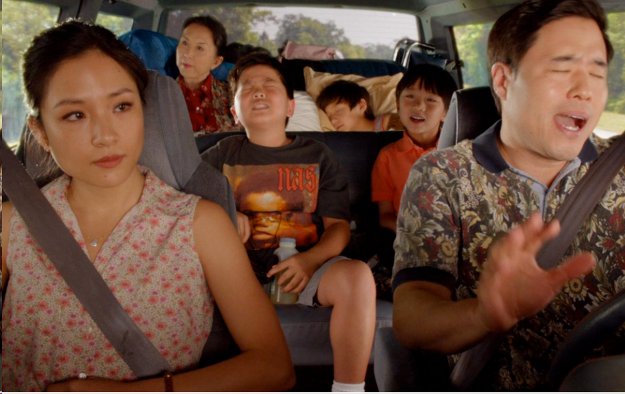How ABC Ruined Eddie Huang’s ‘Fresh Off the Boat’

In many, obvious ways, Fresh Off the Boat is just like any other sitcom on network television. The show chronicles the misadventures of a dysfunctional yet loveable family. It employs a breezy narrative pace and a light, inoffensive sense of humor. Every episode touches on thematic problems that lead to lessons learned. Conflicts are ultimately wrapped up neatly with a tidy resolution and a positive message.
But the show departs from expected sitcom tropes in one crucial aspect, groundbreaking because it hasn’t happened for two decades: Fresh Off the Boat is a sitcom about Asian-Americans. In early February, entertainment critics and the Asian-American community alike eagerly anticipated the pilot episode, holding their collective breathe to see how this show would depict a minority that remains largely unrepresented by the media.
All-American Girl, a 1994 sitcom starring comedian Margaret Cho, about a Korean-American family living in San Francisco, marks the last time a television network attempted to create a show featuring Asian-Americans as main characters. It lasted only one season. Although Cho’s standup supposedly served as inspiration for its plotlines and jokes, All-American Girl incorporated none of her edgy, provocative brand of comedy. Cho was famous for discussing topics like racism, sexuality, and politics honestly and often crudely, but the show was flat and predictable and safe. Asian-Americans rejected it because of its stereotypical portrayal of Korean characters and because they claimed it didn’t accurately reflect their own experiences as a minority in this country; the general population rejected it because it wasn’t all that funny.
So when ABC announced its intention to create a new show based on the 2013 memoir of celebrity chef and TV and Internet personality, Eddie Huang, audiences hoped the writers and producers would not repeat the same mistakes they made with All-American Girl. Huang’s book, entitled Fresh Off the Boat like the sitcom modeled after it, narrates his experience as a Taiwanese immigrant growing up in white America. With his characteristically foul language and bawdy sense of humor tempered by real intelligence and candor, he describes a troubled childhood in Washington D.C., and later in Orlando, Florida, where he struggled to find his identity. Bullied by his peers at school and harmed physically and psychologically by his abusive parents at home, Huang flirted with rebellion, violence, and crime throughout his adolescence and early adulthood, connecting strongly with hip-hop and African-American culture because it aptly expressed his own feelings of pain and alienation.

Fresh Off the Boat was largely met with positive reviews. Critics praised Huang’s sharp wit and perceptive observations about racism. A review from The New York Times called it, "a surprisingly sophisticated memoir about race and assimilation in America." Through the frank retelling of his childhood, Huang demonstrates his tortured inward battle between pride of his origins and respect for his parents who, despite their abuses, raised him to be strong and independent, and the intense self-loathing that arose from never quite fitting in with the culture of his adopted country. This is an important narrative because it is genuine. Because this is how it really happened for one Asian-American. Because Huang shatters the image of the “model minority” that America has wrongly perpetuated for so many decades.
And so, in many ways, the sitcom version of Huang’s life is disappointing for the same reasons – if not to the same extent – that All-American Girl was disappointing. It is a watered-down version of Huang’s personal Asian-American experience. Fresh Off the Boat does retain the bare bones of the memoir: it is set in Orlando in 1995 and features an 11-year-old Eddie (played by newcomer Hudson Yang), his younger brothers Emery and Evan, his parents Louis and Jessica, and his grandmother. It shows them trying to assimilate after moving from Washington D.C.’s Chinatown to suburban Florida, where Louis has opened a Western-style restaurant. Several episodes also incorporate anecdotes pulled more or less from Huang’s life, such as the first time someone called him a racist slur, or the many times his school sent child protective services to his house because they suspected abuse (granted, in the show this incident comes across as comical rather than as tragic or disturbing, as it was in real life).
To its credit, Fresh Off the Boat deals with matters of race, stereotypes, and the clash between Asian and American culture head on, in a way that network TV rarely dares to do, or perhaps has ever done before – if only because it addresses race at all. Several storylines, such as an episode in which Mrs. Huang comes to the conclusion that school is too easy because her kids earned all A’s, or the episode in which she re-writes the elementary school play so that the doctor and lawyer characters grow rich while the actor character ends up homeless, address the stereotype of Asian parents who expect their children to work hard and be high achievers. A plotline where Louis and Jessica compete with visiting relatives over who is wealthier, and a running joke about Jessica’s obsession with country clubs, refer to the stereotype of Asians’ fixation on material success. Frequent references to Mrs. Huang’s cheapness and haggling skills, an episode in which Emery and Evan struggle in vain to win their mother’s approval through increasingly impressive accomplishments, or a storyline that revolves around Jessica’s aversion to the number four (because of a Chinese superstition that the number four brings bad luck), among many other similar instances, play with the various differences between Asian and American values.

Yet, despite its frequent use of Asian culture as a source of humor, Fresh Off the Boat handles the subject of race without ever veering into racism because it never treats being Asian as the butt of the joke. These characters are not meant to be funny because they are Chinese (for instance, the parents’ accents are never presented as something to laugh at), but because they are funny in and of themselves. By demonstrating their nuanced personalities, flaws, and emotions, and by showing that they can grow and change throughout the story, this sitcom presents characters who are more than just Asian faces. They are Chinese, yes – and this shapes their identities – but they are first and foremost people.
The high-strung yet sympathetic and truly amusing performance of Constance Wu as Jessica Huang, which has garnered her significant Emmy buzz, breathes humanity into this show. Other notable performances include those of the precocious Forrest Wheeler and Ian Chen, the actors who play little brothers Emery and Evan, as their endearing back-and-forth provides constant comic relief. Hudson Yang, too, does an admirable job portraying the adolescent Eddie Huang.
That being said, all the unpleasant details that made Huang’s memoir so meaningful have been routinely erased from this show to make it more palatable for American audiences. Characters are portrayed as softer, more likeable versions of the real thing, and any encounters with racism are painted with light strokes that underplay the serious and damaging effect racism had on Huang’s life. In the show, while Eddie’s mother is strict and humorously erratic, she is never mean, or even crazy, like she is in the book. His father, whom Huang clearly describes as a hard man, comes across as sensitive and optimistic and silly on TV. The sitcom also trivializes Eddie’s relationship with rap as a funny quirk, despite the memoir’s insistence that his connection to hip-hop culture was serious, that he viewed music as his salvation, his religion in a culture that neither understood nor valued him. And of course, the show doesn’t even touch on the topic of emotional and physical abuse, or of any instance of marital or familial unhappiness, that so marked Huang’s childhood.

Because Fresh Off the Boat is a sitcom, the conflicts it presents are predictably resolved at the conclusion of every episode and tied up with a pretty bow. Characters learn their lessons and figure out how to solve their problems. Whatever cultural differences a character demonstrates, and whatever mistakes that character makes, he or she remains ultimately likeable. The family may struggle to fit in with their American peers, but racism never scars them or makes them unhappy.
While this makes for entertaining, easily-digestible television, it also means that the show misses out on an opportunity to depict the realities of life for many Asian-Americans who find themselves caught between two cultures. By making Fresh Off the Boat a “lite” version of Eddie Huang’s life, the writers turned what was a genuine and highly-personal Asian-American experience into a generic, inoffensive story fit for American consumption. In other words, this is an-Asian American show written for white people.
On February 4, 2015, just after the premier of the sitcom based on his memoir, Huang published a piece on Vulture.com describing the frustrations he faced when ABC took his gritty autobiography and turned it into a fluffy sitcom. Although he wielded an unusual amount of control over the project, as the terms of the sale of his book to ABC dictated that Huang would become producer of the show, he admits that he was naïve to the way Hollywood works and felt blindsided by how radically they changed his story. He was upset, for instance, when he learned that Iranian-American writer Nahnatchka Khan had been attached to the show instead of a Chinese-American who would have better understood Huang’s perspective. He was disappointed, too, when a room of writers rejected or altered many of the moments he considered crucial to his narrative.
Huang’s relationship with the team creating Fresh Off the Boat became increasingly tense, until he finally distanced himself from the show altogether. In April, he sent out a series of tweets criticizing the show: “For the record I don’t watch #FreshOffTheBoat on @ABCNetwork”; “I had to say something because I stood by the pilot. After that it got so far from the truth that I don’t recognize my own life.”; and, “I don’t think it is helping us to perpetuate an artificial representation of Asian-American lives and we should address it.”
Ultimately, network television is probably the wrong venue for discussing the dark underbelly of racism and inequality in America. Edgier shows belong on HBO or Fox or Netflix. Still, Fresh Off the Boat allowed Huang to kick open a door that had been closed to Asian-Americans since the 1990s. Early in May, ABC announced that it will renew the show for another season, proving that there is indeed an audience for stories about minority experiences. Who knows – it may one day pave the way for a show that truly provokes an honest dialogue about race in America.
Author Bio:
Melinda Parks is the pen name of a contributing writer at Highbrow Magazine.
For Highbrow Magazine






























































































































































































































































































































